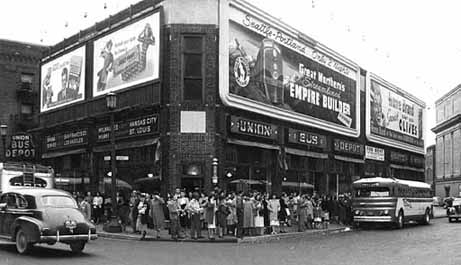Difference between revisions of "St. Paul Greyhound Bus Depot"
(New page: Image:Svc_greyh.jpg ---- This page is still under construction. -SVC Part of Minneapolis/St. Paul, MN: 100 Queer Places in Minnesota History, (1860-1969), (1969-2010)) |
(table) |
||
| Line 1: | Line 1: | ||
| − | [[Image:Svc_greyh.jpg]] | + | |
| + | St. Paul’s Greyound Bus Depot is a vanished element of the capital city’s onetime urbanity. Wedged between a bizarre intersection of downtown streets, the station sat amid a cacophony of streetcars, theaters, and storefronts. Buses from all over the country deposited queer travelers within blocks of The Coney Island Restaurant, Kirmser’s Bar, The Golden Rule/Emporium Department Stores, and the Bremer Arcade—the depot was a gateway to St. Paul’s pre-Stonewall gay world. | ||
| + | |||
| + | |||
| + | {| {{prettytable}} | ||
| + | ! | ||
| + | ! | ||
| + | |- | ||
| + | | [[Image:Svc_greyh.jpg]] | ||
| + | | Like St. Paul Union Depot before it and the Minneapolis/St. Paul International Airport to follow, the bus station was part of a clandestine underground. Queer men used the terminal to engage others in sexual activity, and they also used it to pass along discreet messages. Ricardo J. Brown recalled that the urinals offered the only advertisement for Kirmser’s Bar; scrawled messages such as “69 at Kirmser’s Bar” were cryptic enough to pass all but the most discerning eyes. | ||
| + | |} | ||
| + | |||
| + | |||
| + | |||
| + | |||
| + | The anonymity of urban travel destinations largely permitted sex between men; sexual activity in Greyhound Bus stations was prevalent from West Hollywood to Jackson, Mississippi. The stations were occasionally dangerous places, as undercover Vice Squad officers exhibited themselves in order to capture gay men in the act. | ||
| + | |||
| + | |||
| + | Interestingly, sex between men was likely only one form of queer activity at the bus depot. Angela Weir and Elizabeth Wilson emphasized the historical importance of “The Greyhound Bus Station in the Evolution of Lesbian Popular Culture.” The authors noted that bus stations released men and women from the confines of traditional family life; they wrote that “Women as well as men were becoming more mobile in the postwar United States.” Greyhounds became symbolic of mobility—an essential element of queer life in the 20th century. | ||
| + | |||
| + | |||
| + | The greyhound relocated to 9th and St. Peter in the 1950s before moving to its present location west of the Minnesota State Capitol. Its old site is now a traffic roundabout. | ||
Revision as of 20:50, 22 March 2010
St. Paul’s Greyound Bus Depot is a vanished element of the capital city’s onetime urbanity. Wedged between a bizarre intersection of downtown streets, the station sat amid a cacophony of streetcars, theaters, and storefronts. Buses from all over the country deposited queer travelers within blocks of The Coney Island Restaurant, Kirmser’s Bar, The Golden Rule/Emporium Department Stores, and the Bremer Arcade—the depot was a gateway to St. Paul’s pre-Stonewall gay world.
The anonymity of urban travel destinations largely permitted sex between men; sexual activity in Greyhound Bus stations was prevalent from West Hollywood to Jackson, Mississippi. The stations were occasionally dangerous places, as undercover Vice Squad officers exhibited themselves in order to capture gay men in the act.
Interestingly, sex between men was likely only one form of queer activity at the bus depot. Angela Weir and Elizabeth Wilson emphasized the historical importance of “The Greyhound Bus Station in the Evolution of Lesbian Popular Culture.” The authors noted that bus stations released men and women from the confines of traditional family life; they wrote that “Women as well as men were becoming more mobile in the postwar United States.” Greyhounds became symbolic of mobility—an essential element of queer life in the 20th century.
The greyhound relocated to 9th and St. Peter in the 1950s before moving to its present location west of the Minnesota State Capitol. Its old site is now a traffic roundabout.
This page is still under construction. -SVC
Part of Minneapolis/St. Paul, MN: 100 Queer Places in Minnesota History, (1860-1969), (1969-2010)
